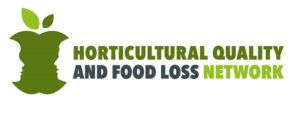It is estimated that one third of food produced globally is wasted before it is consumed. In the UK, this equates to >15 million tonnes of food and drink annually; valued at over £20 billion. More than 50% is wasted in the supply chain before reaching the consumer’s home because products do not meet quality expectations. Horticultural crops (vegetables, fruit, potatoes) are major components of a healthy diet and the provision and consumption of a diet rich in these offers significant benefits to human health.
The UK is committed to reducing food losses and waste by half by 2030 (UN SDG 12.3). The Biotechnology and Biological Sciences Research Council (BBSRC) have identified significant opportunities for science to reduce food losses in horticultural crops through novel and enhanced connections between multi-disciplinary researchers and research end-users including industry and policy makers (BBSRC Strategic Priorities for AFS).

The Horticultural Quality and Food Loss Network (HortQFLNet) was established in response to the real need to understand how and where better crop quality and reductions in crop losses can be achieved. HortQFLNet is a 3-year BBSRC funded Network, which is co-directed by Professor Carol Wagstaff, Head of School: Chemistry, Food and Pharmacy. The aim of the Network is to act as the leading collective voice for the UK horticultural and postharvest community and to ensure continuity of research in improving crop quality and postharvest food loss in the future.
The UK produces a diversity of horticultural produce which, whilst being something to celebrate, also means that a “one size fits all” approach to understanding the underlying science and addressing these challenges may not be possible.
From a pure plant science perspective, the challenges are numerous but exciting. Methods of sustainable production and food system practices need to be better understood and further developed in order to deliver high quality produce to UK consumers.
Pollination biology, regulation of dormancy, manipulation of flowering time and ripening/senescence and increasing resilience to abiotic stress are all key to achieving an increased harvest window for UK grown crops. The genetics underpinning plant organ boundaries, plant architecture and cell structure are key to optimising uniformity of size, shape and the capacity of a crop to be processed or stored, thus ensuring consistency and uniformity of crop quality. A deeper understanding of pathogens, when and how they enter the plant and the mechanism of when they manifest disease symptoms – often much further down the supply chain – is key to preventing postharvest crop spoilage. Understanding, optimising and manipulating the chemistry, genetics and molecular biology that regulates the physiological breakdown and discolouration of tissues that limits storage time and shelf life of many of our fruit and vegetable crops is equally important.
Additionally, more applied technological challenges need to be addressed such as the demand for less plastic packaging and lowering environmental footprints for more sustainable production.
Opportunities available: the 2021 Funding Call
HortQFLNet launched its 2nd Funding Call on 4 May 2021 and invites plant science and technology focussed researchers with a particular interest in addressing horticultural crop quality (fruit, vegetables and potatoes) and postharvest food loss to apply for research funding.
Now in its second year, £90K is available to fund Pump Priming project applications in this call; 50% of which is ringfenced for ECRs. We anticipate awarding funds to 4-5 projects of up to £20K each (equivalent to 80% fEC). Each project will have a duration of 3-9 months. Additional funding of £10K in total will be available to support academics and industry partners to encourage co-development of project ideas through Business Interaction Vouchers (BIV) and Networking Visit Funding (NVF).
By providing funding opportunities, the Network aims to attract fundamental or applied plant science-based and technology researchers to develop innovative scientific and technological solutions to reduce food loss and improve the quality of UK horticultural crops. By encouraging and facilitating collaborations with other academics or industrialists through available BIV/NVF funding, the Network aims to connect scientists and industry to co-develop ideas that could be developed into pump-priming projects. 50% of pump priming funding is ringfenced for ECRs.
How to apply for research funding
The funding call is open to all UK based researchers at UKRI eligible institutions through a single annual selection process. Applications should be made by completing the relevant application form (pump priming or BIV/NVF). Application forms and call guidance documents will be available on the website shortly. The call guidance documents provide full details of the application and evaluation/selection processes including details of the criteria against which project proposals are evaluated.
Application forms should be returned to the Network by email to info@foodlossnetwork.com by 17:00 on 6 August 2021. Successful awardees will be notified by early October 2021. Projects will be able to commence once the award funding process has been completed.
COVID pandemic: It is hoped that travel restrictions currently imposed due to the ongoing pandemic will start to be lifted and enable Networking Visit Funding activities such as travel to other Institutions to proceed. However, Network activities will continue to be subject to any restrictions imposed as part of the Government’s COVID-19 Recovery Strategy.
Interested in finding out more?
We invite you to become a member of the Network. Membership is free and open to all. Members receive a bi-monthly e-newsletter, have opportunities to network/contact members and will have access to a member only page soon – currently under development on the website. You can sign up to become a member via the website.

This is an opportunity to learn more about the Network and the 2021 Funding Call, meet and network with fellow academic researchers and industry partners, talk to the 2020 Cohort about their experiences of putting together a research proposal and find out ‘What makes the perfect research proposal’.
The Sandpit is open to all – please register here if you would like to attend.
Further information about the Network and Funding Opportunities can be found at HortQFLNet’s website. Please address any specific questions to Jane Bradbeer, Network Manager (SCFP) via info@foodlossnetwork.com.
Follow the Network on Twitter (@HortQFLNet) or connect with us on LinkedIn (search for ‘Horticultural Quality and Food Loss Network’).
Jane Bradbeer is Network Manager of the BBSRC Horticultural Quality and Food Loss Network (HortQFLNet).
